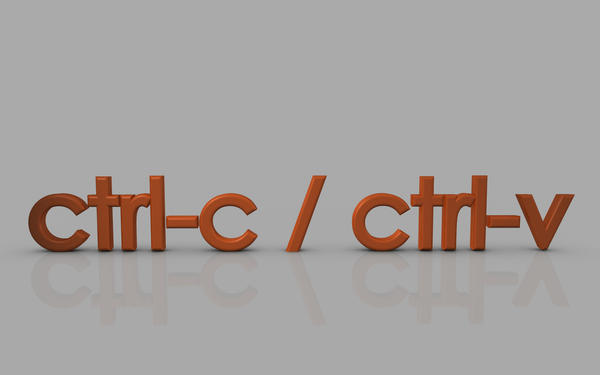In my opinion, the modern problem of plagiarism stems from our shift - as learners - who used to assimilate information from codices (traditional bound paper books) and now do so from digital content.
When you have a codex (a paper book), and you're researching, you're not going to copy all of the information. That's ludicrous! It would take way too much time. So, instead, you take the time to understand it and jot down only what's important. You write down a few quotes, because your teacher said you had to have them, and the rest is in your own words. That's the reality of what's going on behind the average student's research motivations; the path of least resistance.
However, with digital content, the student can grab and go. They can copy, paste, and then worry about UNDERSTANDING later. This causes multiple challenges:
First, is that the student with digital content has WAY more information than we were used to parsing through when we were their age. When I was studying, I had the library and maybe some databases. My students, however, have 24/7 simultaneous access to 63 databases and 112,000 e-reference books. All text-searchable and able to be copied and pasted. And that's NOT including Google or Wikipedia!
Second, they have to ASSESS the validity and quality of their information before they can even proceed! When you are handed a book, (before the age of self-publishing), you knew that book went through an editor, publisher, distributor, and many other cognitive authorities who guaranteed that the information you were getting was current and correct. With the internet, that is GONE, and students are not prepared to make those assessments themselves. Most teachers haven't received that training either. It's the blind leading the blind.
Third, students have to reverse engineer their understanding. When you find reference after reference and just copy and paste what you get, the next thing you know, you have 50 pages of unrelated information in a huge doc. It might feel like you're "easily" finding all this great stuff, but now you have to sift through all of it. This is the exact opposite of note-taking skills, which train you to jot down what's important. Cutting down huge pieces of information takes advanced proof-reading and editing skills, which are not regularly practiced (as is evidenced by anyone who has read a student-written essay recently). Students are forced to do this alone, with little or no guidance.
Fourth, it's so much easier to just re-arrange on the page what's already been written there, after you've copied and pasted it. It's hard to figure out a way to write anything better than the original author wrote it. So, instead, students play tetris with the words - move the stuff around - and hope that you don't notice. Their papers sound brilliant, yet they have no idea what they actually put together.
Doing research today IS harder, not easier, and we need to meet that challenge.
Therefore, my advice, is to approach the problem by recognizing that students are always going to take the path of least resistance. They are always going to satisfice; sacrificing quality as long as they SATISFY the requirements of the assignment. They did it before (easier to jot down a little from a book then copy the whole thing) and they're going to keep doing it. The truth is that Wikipedia really is "good enough," for most K-12 assignments.
The model of how our information arrives has changed, therefore we must change the way we sift through it, learn it, and teach it.
I don't have a #1 answer. But here are some things I've tried:
- Before starting a research project, go through an entire unit JUST about the differences between plagiarism and paraphrasing. BrainPOP.com has some great videos and quizzes for that. And don't hesitate to collaborate with your school library media specialist to accomplish it!
- Showcase stories of students who have been kicked out of colleges for plagiarism, so they understand it's serious! The more personal the story, the better.
- Teach the ISP (information search process), as outlined by Carol Kuhlthau: http://comminfo.rutgers.edu/~kuhlthau/information_search_process.htm. The ISP teaches students that exploration, discovery, and thought should precede the frantic scurried gathering of information that students usually start with. This can curtail some of the information overload.
- Restrict which sources students are allowed to use. I have had great success using clipboard.com for this. I create boards for specific projects, and teachers ask students to ONLY use the clipboard if they wish to use online resources that are outside of my databases. Here is my clipboard, if you'd like to see how I am using it: http://clipboard.com/LHSMediaCenter/boards
- Teach a website validity lesson. There are dozens of well-designed sites out there that are totally fake, and made just to teach students that, just because it's online, doesn't mean it's real or right. I have collected several and you can find them in my clipboard, tagged#RealorFake
I once heard that trying to research today is like trying to take a drink from a fire hydrant. Let's teach our students how to either turn down the deluge, or find a respectable water cooler instead.
Subscribe to:
Posts (Atom)
Lead to the Normal
We need to normalize mistakes and bad hair days. Not knowing the answer to questions even though we are library workers. We need to normal...

-
Someone recently asked me how I pick where a book would go if it meets multiple genres. The truth is, it is extremely rare that a book ON...
-
I am a lucky librarian! I work in a gorgeous, air conditioned two-story 5,000 square foot space. My administration has always been super...
-
I am so excited to announce that we have begun the process of genrefying the fiction section in our high school library media center! Th...

